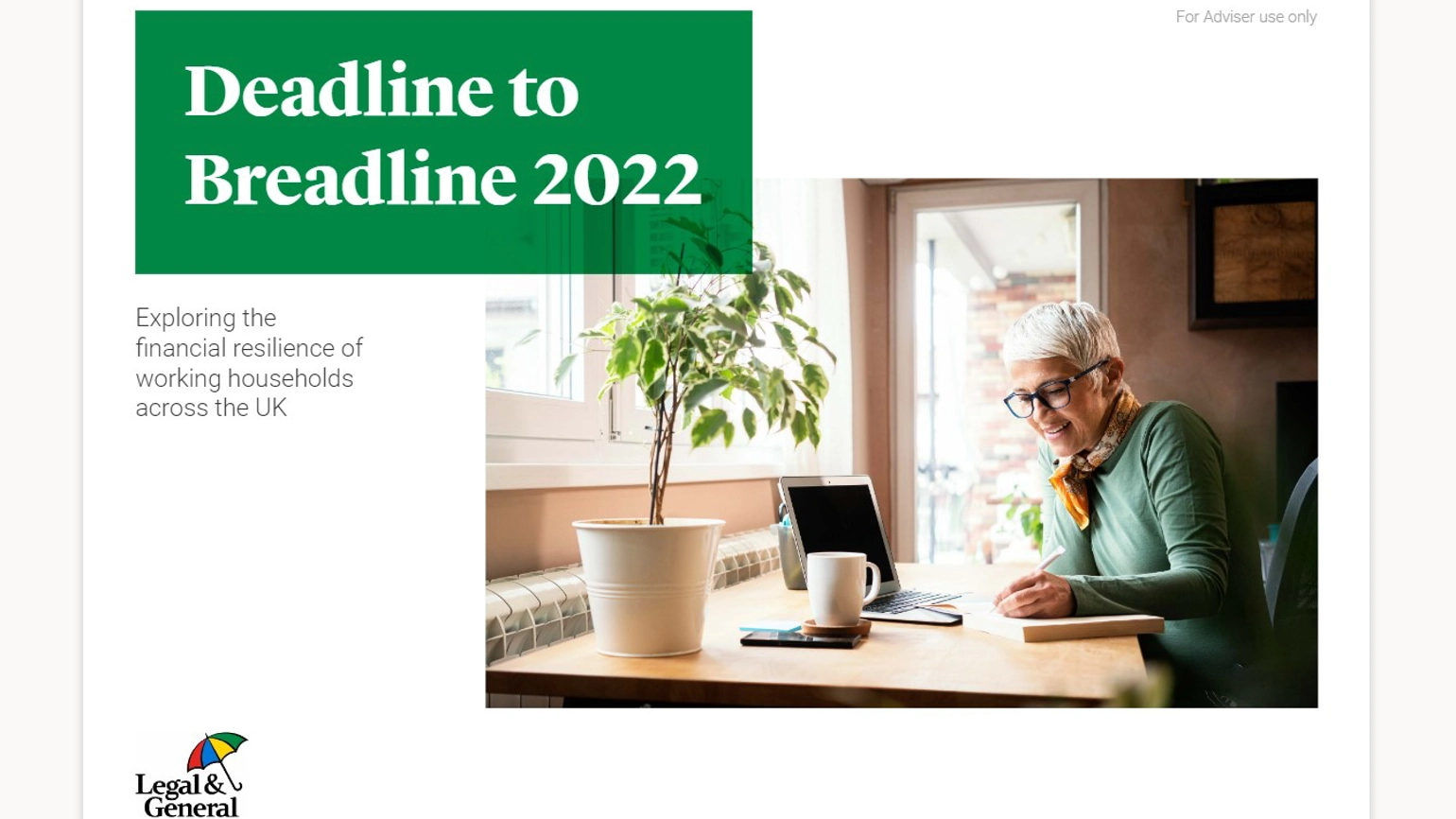- Retirement income, including annuities
- Lifetime mortgages/equity release
- Retirement financial advice
- Care
- Protection
Shrinking safety nets: Working families raid savings to meet the demands of rising living costs
The average working household has £2,400 in savings – the equivalent of less than a month’s worth of basic expenses. Over half of all savers say they will fall back on their rainy-day funds to meet rising living costs. Working families estimate they need £12,100 in the bank to feel financially secure but less than a third of households have this set aside. It would take the average household three years to put aside the desired financial safety net. Legal & General has published its ‘Deadline to Breadline’ report to help advisers in their conversations with clients against the backdrop of the cost-of-living crisis.
28 Sept 2022
Full press release

Legal & General has published its ‘Deadline to Breadline’ report to help advisers in their conversations with clients against the backdrop of the cost-of-living crisis.
One in four working households with savings (28%) have started dipping into them to meet rising living costs, according to a report from Legal & General1. A further 30% anticipate they will need to do so in the next year.
With consumer prices 10.1% higher in July 2022 than a year before2, and with annual household energy costs set to rise to an average £2,500 in October 20223, many households will likely have to rely even more on the money they have tucked away. This could see household savings built up during the pandemic lost.
The average working household currently has £2,400 in savings. However, this equates to less than a month of basic expenditure for the average family, if they lost their income and were pushed to rely on their savings.
Financial security under threat
To feel financially secure, households estimate they need £12,100, or nearly five months worth of basic household expenses, set aside. However, only three in 10 working households (30%) have this set aside, and pressure to dip into savings will likely see this number fall.
Based on current savings patterns, with the average working household saving just over £300 a month, it would take three years to reach the desired financial safety net, and nine years to put aside a year’s worth of essential spending. However two-thirds (64%) of all households that currently save have either already decreased or stopped their savings habit altogether (31%), or expect to have to do so (34%), due to increased living costs.
No safety net for some
There is also a growing number of people who cannot put aside any money; nearly 1.9 million households have no money left at the end of the month, an increase of 330,000 since 2020. This is likely why 16% of households have no savings at all in case of emergency.
Bernie Hickman, CEO, Legal & General Retail: “With the cost of basic essentials on the rise many households will find themselves having to make difficult choices and dipping into savings is likely to become more common. This is a far cry from the five-month financial safety net that people hope for.“It can be concerning for people to feel like they have nothing to fall back on in times of difficulty. While dipping into savings is inevitable for some, there are also steps people can take to try to control their costs as much as possible by checking their regular outgoings and subscriptions, shopping around for discounts and deals and by making sure they are taking up free financial guidance services like MoneyHelper. To help people better understand their money and make informed decisions, we have put together a financial safety net content hub to help people find free tools and resources.”
Legal & General’s Deadline to Breadline report, explores financial resilience, security and engagement of working households across the UK. The report contains key ‘conversation starters’ for advisers to help with tricky questions during this difficult time for clients.
Notes to editors
1 Online survey among 5021 UK consumers using Savanta’s proprietary consumer panel between the 28th June and 5th July 2022.
The survey covered employed & self-employed consumers aged 18 to 65 only, approximately nationally representative but ensuring a minimum sample in every region of the country. This extrapolates to approximately 31.228 million adults in the UK. Results were re-weighted to represent the UK population in terms of age/gender, region & employment status.
All averages that are shown are median values. References to income refer to household income.
Basic expenses are housing costs, loans/ credit card repayments, utility bills and food.
Further information




